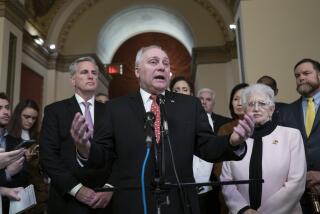Need for National Energy Policy
- Share via
The Times editorial “Guzzling Oil” (Feb. 20) correctly warns of the dangers facing this nation in its steadily increasing reliance on imported oil, amounting to 45% of total petroleum consumption in January.
To cope with the rising menace of oil imports, The Times recommends adoption of a national energy policy that includes conservation by users and development of alternate energy sources. Unfortunately, those measures--even if instituted promptly--are not sufficient to assure gasoline enough to keep automobiles rolling, industrial machinery producing and electric power plants operating. What is urgently needed now is a meaningful “Declaration of Energy Independence.”
There are effective measures that are readily available to reduce our precarious reliance on overseas suppliers of oil, but those alternate means are being blocked by environmental extremists and political forces. For example, attempts to increase offshore oil drilling along the California coast have met strong opposition.
Nuclear energy is another alternate power source that faces formidable challenges whenever it is proposed. The U.S. Council for Energy Awareness of Washington, D.C., reports that the nation’s existing 110 nuclear electric plants have cut foreign oil dependence by 3 billion barrels since the first Arab embargo in 1973-74 and have saved us over $100 billion. They say more plants are needed. But mention of any new nuclear power installations sets off a storm of protesters.
Some years ago studies were under way for construction of a large hydroelectric power plant in Bridge Canyon, on the Colorado River, above Lake Mead and the highly successful Hoover Dam power plant. Hydro plants run cleanly, without any emissions to the atmosphere. They are an ideal electric power source. Nevertheless, largely through a nationwide propaganda campaign by the Sierra Club, that desirable project has been shelved.
The conservation program that The Times suggests is desirable, but it is not enough. Strict rationing is inevitable at some future critical time unless the opposition to proven and reliable alternate energy resources is overcome.
ROBERT LEE
Newport Beach
More to Read
Sign up for Essential California
The most important California stories and recommendations in your inbox every morning.
You may occasionally receive promotional content from the Los Angeles Times.













